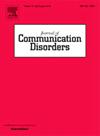与老年人一起工作的专业人士在听觉认知互动方面的知识、经验和意识。
IF 2.1
3区 医学
Q2 AUDIOLOGY & SPEECH-LANGUAGE PATHOLOGY
引用次数: 0
摘要
听力损失是痴呆症的常见情况。研究已经提出了听觉-认知相互作用的理论框架,尽管目前还不清楚听力学家以外的专业人员是否以及如何在临床实践中对这种相互作用采取行动。方法:编制64项在线问卷,评估受访者的工作环境以及他们对听力损失、认知能力下降和听觉认知联系的知识、经验和意识。调查问卷被发给了与老年人打交道的荷兰专业人士。受访者的调查时间为2022年5月至9月。结果:206名平均工作经验为16年(范围:6个月- 42年)的非医生和25名平均工作经验为13年(范围:8个月- 42年)的医生填写了整个问卷。人们普遍倾向于将听力障碍和认知障碍视为不同的实体,忽视它们的共存和相互作用。结果还显示,在评估老年人的听力和认知状况方面存在缺陷,大多数依赖于老年人的自我报告或间接(非)口头线索。这些策略强烈依赖于专业人员的意识和知识,特别是在听力相关方面,被认为是有限的。例如,努力倾听几乎没有被受访者报告为一项重要的听力相关投诉。最后,沟通策略不足,专业人士采用一般方法,但缺乏特异性。结论:除了听力学家之外,专业人员还需要提供关于听觉-认知相互作用的具体信息,以及在临床实践中如何采取行动的指导方针,以优化老年人的以人为本的护理。本文章由计算机程序翻译,如有差异,请以英文原文为准。
The knowledge, experience, and awareness of professionals working with older adults on the auditory-cognitive interactions
Introduction
Hearing loss is a commonly occurring condition with dementia. Research already presented a theoretical framework for the auditory-cognitive interactions, though it is still unclear if and how professionals beyond audiologists act upon this interactions in clinical practice.
Methods
An online 64-item questionnaire was developed and evaluated respondents’ work setting as well as their knowledge, experience, and awareness regarding hearing loss, cognitive decline, and the auditory-cognitive link. The questionnaire was sent to Dutch professionals working with older adults. Respondents were surveyed from May to September 2022.
Results
Two hundred and six non-physicians with a mean work experience of 16 years (range: 6 months - 42 years) and 25 physicians with a mean work experience of 13 years (range: 8 months - 42 years) filled in the entire questionnaire. There was a prevailing tendency to treat hearing and cognitive impairment as distinct entities, overlooking their coexistence and interactions. Results also showed a deficiency in assessing the hearing and cognitive status of older adults, with most relying on the older adult's self-report or indirect (non)verbal cues. Those strategies are strongly dependent on the professional's awareness and knowledge which were, especially for the hearing-related aspects, considered limited. For example, effortful listening was barely reported by the respondents as an important hearing-related complaint. Last, communication strategies fall short, with professionals adapting general approaches but lacking specificity.
Conclusion
Specific information for professionals beyond audiologists regarding the auditory-cognitive interactions as well as guidelines how to acted upon in clinical practice are needed to optimise person-centered care for older adults.
求助全文
通过发布文献求助,成功后即可免费获取论文全文。
去求助
来源期刊

Journal of Communication Disorders
AUDIOLOGY & SPEECH-LANGUAGE PATHOLOGY-REHABILITATION
CiteScore
3.30
自引率
5.90%
发文量
71
审稿时长
>12 weeks
期刊介绍:
The Journal of Communication Disorders publishes original articles on topics related to disorders of speech, language and hearing. Authors are encouraged to submit reports of experimental or descriptive investigations (research articles), review articles, tutorials or discussion papers, or letters to the editor ("short communications"). Please note that we do not accept case studies unless they conform to the principles of single-subject experimental design. Special issues are published periodically on timely and clinically relevant topics.
 求助内容:
求助内容: 应助结果提醒方式:
应助结果提醒方式:


